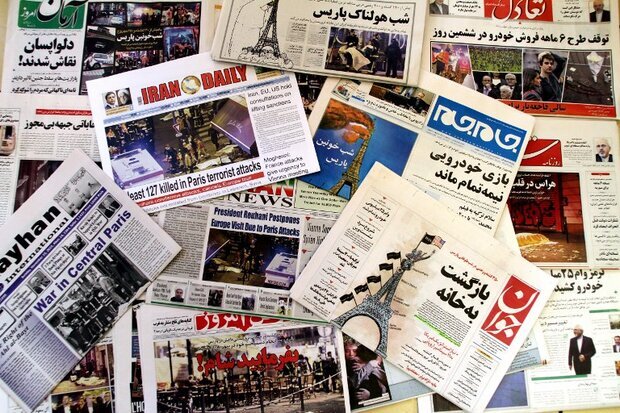Shuttle diplomacy in Middle East in last month of the year

In recent weeks, the region has been witnessed significant developments in the field of diplomacy, Siasat-e-Rooz says.
The resumption of relations between Iran and Saudi Arabia, visit of the Secretary of the Supreme National Security Council (SNSC) Rear Admiral Ali Shamkhani to the United Arab Emirates, Egypt's interest in normalizing relations with Tehran, the trip by Deputy Foreign Minister for Political Affairs Ali Bagheri Kani to Oman, the visit of a Kuwaiti delegation to Tehran, joint naval exercises between Iran, Russia, and China, the fifth meeting of the Iran-Iraq Joint Economic Commission, the visits of Hans Grundberg, the UN Secretary General's Special Representative for Yemen, Belarusian President Alexander Lukashenko to Tehran coupled with willingness by the Maldives to resume relations with Tehran and the meeting of Mohammad-Reza Raouf-Sheibani, the accredited Iranian ambassador in Libya with the country’s foreign minister, and some other diplomatic missions and meetings were among the developments.
These developments show the failure of the Western scenario to isolate Iran from one side and the status of Tehran in regional equations, and also the ability of regional countries to resolve disputes without Western interference.
Also, these developments show the new will of the countries of the region to realize the new world order based on multilateralism.
Arman-e-Melli: Let's only look at national interests
Some analysts and political experts believe that China is not even afraid of military conflict in the new world order. But we noticed there was no provocative response from China during Nancy Pelosi's visit to Taiwan, Arman-e-Melli wrote.
The reason is clear, China pursues its own interests.
f course, China seems satisfied with Russia's involvement in Ukraine because Beijing is noticing that America is focused on the issue of controlling Russia, and if the crisis between Ukraine and Russia leads to peace, the United States will use the same scenario for Taiwan and China.
Through the “One Belt one Road” initiative, China intends to reach Iraq, Lebanon, and the Mediterranean through the south coasts of Iran and then reach Africa. Of course, due to the U.S. sanctions, China is considering other paths to reach its goals.
Iran wants “strategic” relations with China, but China wants not more than an economic partner.
China believes that Iran seeks to attract European investment and if Iran's relations with the West improve, China will be forgotten. But Iran must balance its relations with other countries including China and the West to secure its national interests.
Etemad: Middle East and new developments
The United Arab Emirates has been one of Iran's most important economic partners during the past decades.
The UAE's role in regional developments, including the Yemen crisis, makes the talks between Iranian and UAE officials important and challenging.
If the United Arab Emirates cooperates effectively to resolve the Yemen crisis, this issue can strengthen and help the process of normalizing relations between Iran and Saudi Arabia, Etemad writes in a commentary.
Israel's ties the UAE (after normalizing the relations), the issue of energy, and ways to strengthen cooperation are among the topics that are discussed in the talks.
Concurrent with the announcement that Iran’s secretary of the Supreme National Security Council plans to visit the UAE, Saudi Arabia's interest to invest in Iran was a critical decision. Many people expressed doubts about it, but what has happened shows that this cooperation is possible.
Since the official announcement of the agreement between Iran and Saudi Arabia to resume relations and reopen embassies in Tehran and Riyadh, there have been speculation about the nature of this decision by Saudi Arabia. Some consider Saudi Arabia's move as tactical rather than a strategy. But it is difficult to give a definite opinion on this.
Quds: Will resistance groups be left alone Iran with Tehran-Riyadh deal?
About a week has passed since the signing of an agreement in Beijing between Iran and Saudi Arabia to restore relations, and the new dimensions of the agreement can still be examined, Quds wrote.
One of the dimensions of the agreement is resistance groups and how Iran will deal with them.
We all know that Iran is the main supporter of resistance groups in the region. On the other hand, in the last decade, it was Saudi Arabia that has always been in conflict with these groups, and it was also Saudi Arabia that was attacked by groups close to Iran on its oil facilities. Now the question is raised whether the Islamic Republic will abandon the resistance groups?
In general, Iran's foreign policy in supporting different groups is set according to three main principles: 1- The policy of these groups towards global imperialism. 2- The degree of popularity of these groups. 3- The relationship of these groups with Islamic religion and ideology.
Based on these three indicators, Iran has developed a model for supporting active groups. In this sense, at first, Tehran communicates with the anti-imperialist groups and in the second step it leads them to be in contact with their people and the society in order to reach social and political maturity.
The agreement between Iran and Saudi Arabia will not affect Iran's support for these groups. Basically, these groups no longer need Iran's permanent support and have reached full maturity.
However, concerns remain about some smaller groups. Regarding these groups, it seems that Iran will not stop supporting them, although it will try to improve the relationship between these groups and the governments and make both sides aware of the Zionist regime’s enmity.
